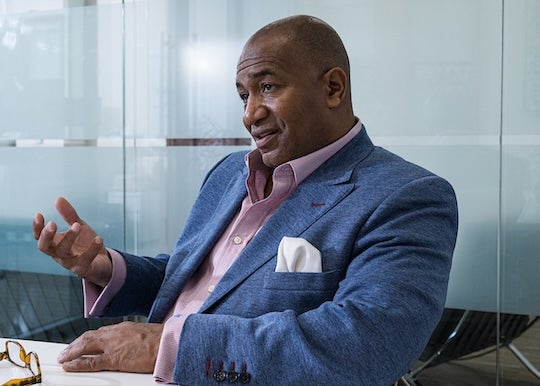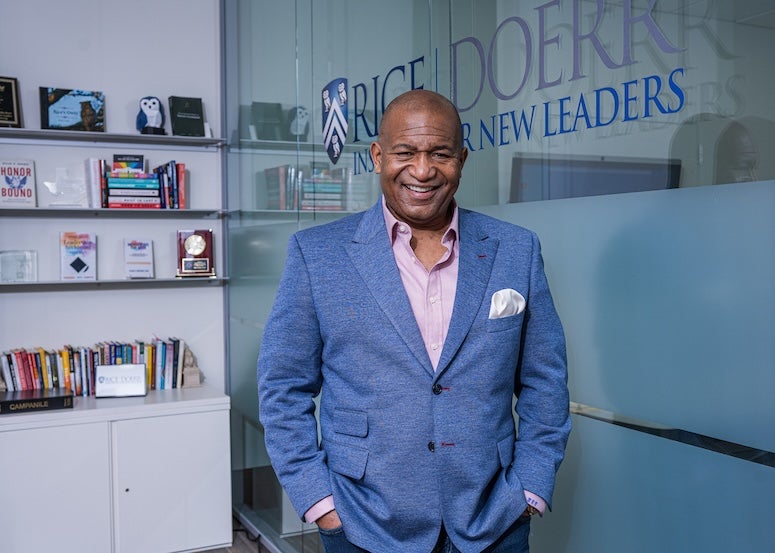Resilient, driven and collaborative. These three adjectives describe the new director of the Doerr Institute for New Leaders, Bernard “Bernie” Banks, who is looking to lead Rice University into a new era of leadership development.

Banks officially became an Owl Jan. 1.
A former brigadier general in the U.S. Army, he most recently filled the role of associate dean for leadership development and inclusion and clinical professor of management and organizations at Northwestern University’s Kellogg School of Management. At Kellogg, he was accountable for leader development integration across the school’s global portfolio of programs and for its community experience initiatives.
Banks graduated from the United States Military Academy at West Point with a bachelor’s degree in political science, before pursuing master’s degrees at Northwestern, Harvard Business School, Central Michigan University and United States Army War College, in addition to a doctoral degree in social-organizational psychology at Columbia University.
Whether it be as a running back for the West Point football team or as a helicopter pilot in the Army, Banks has always had a knack for being a leader and rallying a team together.
To get an idea of how he plans to help develop leaders across campus at Rice, the Rice News team caught up with Banks for a conversational interview:
What have your first few weeks at Rice been like?
“I’m just excited and honored to be here. The Doerr team consists of passionate, talented and wonderful human beings. I am humbled to be in their midst. My job is to enable the team’s successful accomplishment of the Doerr Institute’s and Rice University’s respective missions every single day. Accordingly, I look forward to helping people throughout the Rice community to achieve the full measure of their potential.”
Tell me a bit about your background — where you’re from, where you grew up and how your career began.
“Where I’m from is a loaded question. My family had the privilege of living in a variety of locations throughout my childhood. My father was a career military officer, and my mother was a school psychologist. In 1978, our family relocated from Hawaii to New Jersey, where I attended high school. As a young child living on military installations, I became exposed to the work that my father was performing and that the parents of my friends were performing. And I was simply fascinated by what they got to do on a daily basis. From a young age, I set about trying to set myself up to one day become a military officer as well. So it became my goal to do two things: I wanted to go to West Point, and I wanted to be a helicopter pilot, like my dad. As fate would have it, both of those things transpired, and I’m glad they did.”
What was your experience in the military like?
“I led aviation organizations varying in size and complexity, both in the U.S. and abroad. I flew a helicopter called the Apache. It was a high stakes environment and one where you had to study a lot, you had to demonstrate your competence on a daily basis and one where you are assigned the most challenging of missions — all of which I enjoyed. I loved the camaraderie. I loved the culture. I loved the demands. I loved the dynamism. I loved the adrenaline. I loved the thoughtfulness of it, and so I was very fortunate to lead different organizations all over the place.”

At what point did you begin to realize you might want to explore the effects of leadership and leadership development?
“I’ve always believed in the importance of leadership, and I always sought leadership opportunities. Whether it would be as a student body president or team captain in high school, I always gravitated to those formal roles. I grew up as a competitive athlete and love sports. I played sports throughout my undergraduate years. And still to this day, I view the world through the lens of: How do you build high-performing teams? How do you embrace competition? How do you learn from the experiences you’re amassing? How do you export those learnings to others? And how do you create something that can go out and compete well? I had always had that at my core.
Within graduate school, where I started to study the science of leading and combined those studies with the opportunity to then go teach leadership formally — that’s where I started to grow a greater understanding of what it takes to effectively develop others well. I learned what it takes to put the systems into place, instill the right mindset into an organization and build a cultural emphasis on leader development.”
Talk about how important it is to develop leadership skills in students on campus that they can use in college and beyond.
“One of the things that I’m fond of helping anyone to understand is that leadership is not simply a role you occupy. It’s a way that you are. There have been countless definitions that have been crafted as the phenomenon we call leading and not one of them says ‘must be in charge.’
It’s about helping students to understand that when we talk about leading, we’re simply talking about amplifying one’s ability to be successful in their influence attempts with others. You might never have formal responsibility for the actions of someone else — i.e. be a manager — but you still, regardless of occupation, must learn how to engage well with others if you want to bring about better outcomes or move the needle in ways that you believe are beneficial.”
One of the things that I’m fond of helping anyone to understand is that leadership is not simply a role you occupy. It’s a way that you are.
What qualities do you think make up a good leader?
“Well, leaders need to learn how to communicate well, they need to be great active listeners and they need to have a learning orientation. They need to be ethical. The list goes on. At the end of the day, there is no checklist where if I do this, this and this, I can guarantee you the right outcome. But I can say there are some things that if you lack, we know that it’s going to lower the probability of your ability to be successful. So if you lack integrity, if you aren’t an effective communicator, if you aren’t someone who learns effectively, if you aren’t somebody who displays resilience, if you aren’t somebody who possesses empathy — being low in any one of those things is going to make it much harder for you to successfully influence the actions of others.”
What made Rice University an attractive landing spot for you, and how much did you see in Rice that made you think it would be a good place where you can develop leaders?
“There were several things. I’m a big believer in one, you bet on people. You bet on people, and you bet on ideas. And when thinking about the people at Rice, several things came to the fore. One, you have a tremendous amount of intellectual capital here and a tremendous amount of institutional pride. People really take pride in being part of this community. Two, you’ve got a phenomenal leadership team. From the president throughout the organization, you’ve attracted people with tremendous track records, and those people are committed to being positive change agents. Three, the institution is willing to commit the resources necessary to foster the intentionality I referenced previously. And then the last thing is all organizations go through periods of growth or evolution. This is a natural time in the university’s journey to really think about re-examining the way things happen.
Growing the undergraduate student body, bringing on two new residential colleges, making substantive investments in a variety of research areas — a lot is going on right now, and I’m somebody who’s always been attracted to opportunities to change and build things more than opportunities to maintain things. So given all that’s transpiring here right now, given the commitment the institution has shown to this endeavor of developing leadership capabilities within every member of the community — I just thought it was a unique set of forces that said, ‘Hey, this is a great opportunity right now.’”
What are some of your plans when it comes to research within Doerr and how you hope to utilize research?
“Everything we do at Doerr, we empirically measure. Because of that commitment, it gives us access to so much data that we can use to explore really interesting questions. Ryan Brown and Aaron Pomerantz are doing a variety of research projects through grants from organizations like the National Science Foundation and others to take a look at interesting questions related to the field of leadership and to see what they can glean from the examination of those questions. Going forward, I will continue to support their efforts and those of others who have research opportunities within Doerr or who want to partner with Doerr, so we can start to build a reputation not simply for our student programs but also for the research that’s being sponsored by the institute.”
What is your overall vision for the Doerr Institute moving forward?
“The Doerr team’s vision is to be Rice’s catalyst for ensuring the university is the absolute best in the world at using empirical science to develop the leadership capabilities of its community in a very intentional way. When the world thinks about who excels at intentional leader development, ours is a name that should always come to the fore right away.”
The Doerr team’s vision is to be Rice’s catalyst for ensuring the university is the absolute best in the world at using empirical science to develop the leadership capabilities of its community in a very intentional way.
What are some of your favorite hobbies?
“I love adrenaline, so things that go fast — whether it’s cars, planes, jumping out of planes, skiing. I love sports. Love to travel. Love to read. Love people. Spending time with family and friends. Learning new things. Oh, and I love naps. I’m a feracious napper.”
How much time had you spent in Houston before coming to Rice, and what have been your impressions thus far?
“So I have lived in Texas twice, both times in the Austin area. I’ve had the opportunity to visit Houston once or twice a year back when I was living in Texas. People here are friendly. People have a genuine desire to be helpful. They take tremendous pride in being Texans. Houston has a very international feel to it. You hear lots of different languages spoken. There’s lots of different pockets of ethnicity and various backgrounds. It’s very cosmopolitan, yet regardless of where someone’s been or where they’re from, they enjoy where they’re at.
This is a place where there are a lot of wonderful things going on. This is a place where people genuinely enjoy being part of the community. But it’s also a place where people go out and see the world. I’m excited to explore all of it.”

